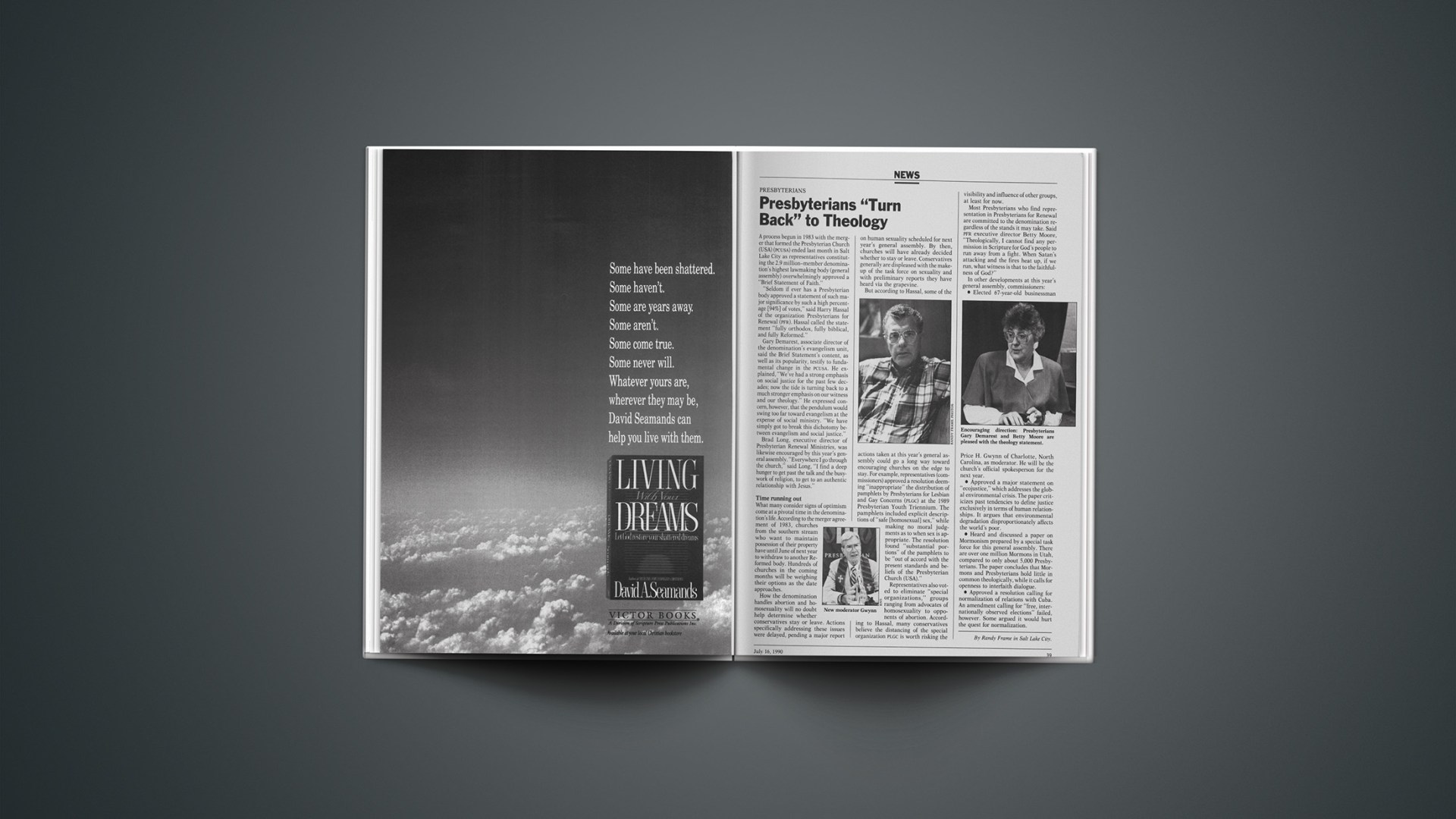A process begun in 1983 with the merger that formed the Presbyterian Church (USA) (PCUSA) ended last month in Salt Lake City as representatives constituting the 2.9 million-member denomination’s highest lawmaking body (general assembly) overwhelmingly approved a “Brief Statement of Faith.”
“Seldom if ever has a Presbyterian body approved a statement of such major significance by such a high percentage [94%] of votes,” said Harry Hassal of the organization Presbyterians for Renewal (PFR). Hassal called the statement “fully orthodox, fully biblical, and fully Reformed.”
Gary Demarest, associate director of the denomination’s evangelism unit, said the Brief Statement’s content, as well as its popularity, testify to fundamental change in the PCUSA. He explained, “We’ve had a strong emphasis on social justice for the past few decades; now the tide is turning back to a much stronger emphasis on our witness and our theology.” He expressed concern, however, that the pendulum would swing too far toward evangelism at the expense of social ministry. “We have simply got to break this dichotomy between evangelism and social justice.”
Brad Long, executive director of Presbyterian Renewal Ministries, was likewise encouraged by this year’s general assembly. “Everywhere I go through the church,” said Long, “I find a deep hunger to get past the talk and the busy-work of religion, to get to an authentic relationship with Jesus.”
Time Running Out
What many consider signs of optimism come at a pivotal time in the denomination’s life. According to the merger agreement of 1983, churches from the southern stream who want to maintain possession of their property have until June of next year to withdraw to another Reformed body. Hundreds of churches in the coming months will be weighing their options as the date approaches.
How the denomination handles abortion and homosexuality will no doubt help determine whether conservatives stay or leave. Actions specifically addressing these issues were delayed, pending a major report on human sexuality scheduled for next year’s general assembly. By then, churches will have already decided whether to stay or leave. Conservatives generally are displeased with the make-up of the task force on sexuality and with preliminary reports they have heard via the grapevine.
But according to Hassal, some of the actions taken at this year’s general assembly could go a long way toward encouraging churches on the edge to stay. For example, representatives (commissioners) approved a resolution deeming “inappropriate” the distribution of pamphlets by Presbyterians for Lesbian and Gay Concerns (PLGC) at the 1989 Presbyterian Youth Triennium. The pamphlets included explicit descriptions of “safe [homosexual] sex,” while making no moral judgments as to when sex is appropriate. The resolution found “substantial portions” of the pamphlets to be “out of accord with the present standards and beliefs of the Presbyterian Church (USA).”
Representatives also voted to eliminate “special organizations,” groups ranging from advocates of homosexuality to opponents of abortion. According to Hassal, many conservatives believe the distancing of the special organization PLGC is worth risking the visibility and influence of other groups, at least for now.
Most Presbyterians who find representation in Presbyterians for Renewal are committed to the denomination regardless of the stands it may take. Said PFR executive director Betty Moore, “Theologically, I cannot find any permission in Scripture for God’s people to run away from a fight. When Satan’s attacking and the fires heat up, if we run, what witness is that to the faithfulness of God?”
In other developments at this year’s general assembly, commissioners:
• Elected 67-year-old businessman Price H. Gwynn of Charlotte, North Carolina, as moderator. He will be the church’s official spokesperson for the next year.
• Approved a major statement on “ecojustice,” which addresses the global environmental crisis. The paper criticizes past tendencies to define justice exclusively in terms of human relationships. It argues that environmental degradation disproportionately affects the world’s poor.
• Heard and discussed a paper on Mormonism prepared by a special task force for this general assembly. There are over one million Mormons in Utah, compared to only about 5,000 Presbyterians. The paper concludes that Mormons and Presbyterians hold little in common theologically, while it calls for openness to interfaith dialogue.
• Approved a resolution calling for normalization of relations with Cuba. An amendment calling for “free, internationally observed elections” failed, however. Some argued it would hurt the quest for normalization.
By Randy Frame in Salt Lake City.










